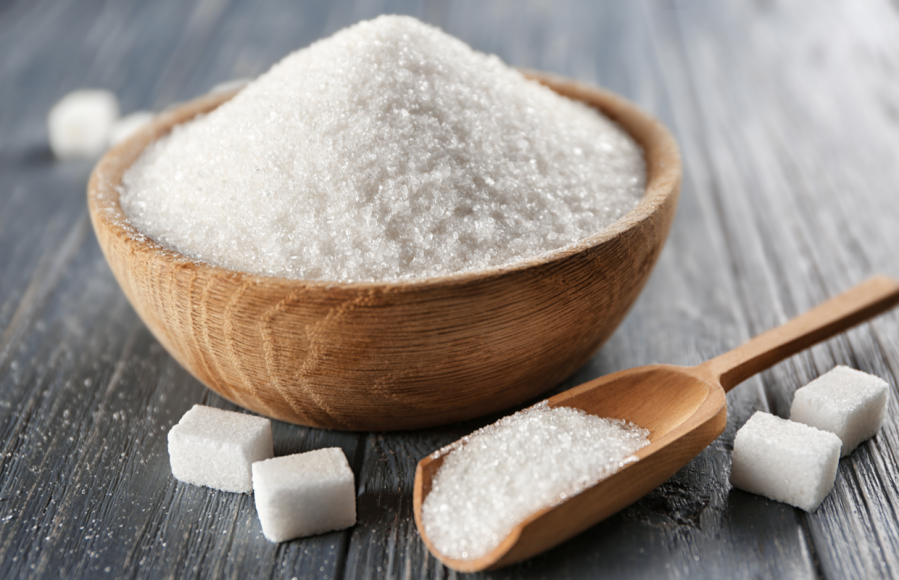Many people wonder: does sugar age you faster? Nutritionist, keto expert and author Pauline Cox MSc is here to explain the link between sugar and premature ageing, before sharing her top tips for embarking on a keto and low-carb way of life to slow ageing and promote longevity…
The way you eat can have an impact on how quickly you age – on the inside as well as on the outside. Your diet, nutrient intake and lifestyle choices all play a part in how rapidly you age. However, there is one huge culprit that can accelerate ageing, causing your skin to sag, and negatively impacting your cardiovascular health. Yes, it’s sugar!
Does sugar age you faster?
When you eat foods that break down into glucose, such as bread, pasta, crackers, biscuits and sweets, your blood sugar rises to provide your body with fuel to be ushered into cells to use for energy. But if you have a very high-sugar, high-carb diet with little physical activity, then the resulting blood sugar rise can remain higher for longer. This can cause damage to the tissues of the body and premature ageing!
Advanced glycation end-products (AGEs) are formed when glucose links to a protein or fat within the tissue. AGEs promote inflammation within the body’s tissues by binding to cells and altering both their structure and function. Higher levels of AGEs are formed with higher levels of blood sugars. We see this in type 2 diabetes, pre-diabetes and those with uncontrolled blood sugars.

The link between sugar and ageing
Excessive sugars in your diet drives premature ageing. This is most visible in your skin as you can see wrinkles and sagging, unlike the damage on the inside of your body, which we cannot see. Sugar can damage skin when glucose links to collagen and elastin within the skin, forming AGEs.
Collagen is important for creating the structural integrity of the skin. When AGEs form, collagen is structurally altered, leading to a term known as ‘sugar sag’. Formation of AGEs within the skin reduces collagen production and accelerates skin aging, leading to loss of elasticity, fine lines, wrinkles and reduced blood flow.
It’s not just within the skin that glucose attaches to proteins and fats to create AGEs. High circulating blood sugars create AGEs within a number of tissues, including nerves and blood vessels. AGEs have been implicated in a host of other chronic conditions, such as hardening of the arteries, Alzheimer’s and chronic lung condition, COPD.
How to slow premature ageing through your diet
Glucose has a prominent role in the formation of AGEs and accelerated ageing, so tweaking your diet can aid longevity. Here’s how to reverse the damage of sugar and slow premature ageing…

Eat a diet rich in antioxidants
Antioxidant-rich foods could reduce the rate at which AGEs are formed. These include blueberries, raspberries, red cabbage, beetroot, spinach, walnuts, garlic, pecans, cinnamon, clove, allspice and oregano.
Resveratrol is the pigment we find in the skin of red grapes and blueberries. Plants produce it in response to injury. Research has shown the protective effects of resveratrol supplementation against the production of AGEs and DNA damage.
Control blood sugars
There is a direct link between levels of circulating blood sugars and accelerated ageing. Your diet is a source of glucose, that leads to higher levels of circulating blood sugars and theformation of AGEs. In a study, tight blood sugar control over a four-month period, saw a reduction of skin AGEs by 25 per cent.
Reducing sugar intake from highly sweetened foods, as well as the high-sugar load carried by refined carbohydrates such as breads, pastas, biscuits, breakfast cereals and cakes, can see blood sugar levels stabilise and AGEs lower.
Try intermittent fasting
Current research suggests that those who don’t eat all the time tend to live longer. One way to achieve this is through time-restricted eating or intermittent fasting. Regular intermittent fasting, triggers your bigger muscles to become more sensitive to insulin and draw the glucose out of the bloodstream This helps to regulate blood sugars and increase insulin sensitivity.
Periods of intermittent fasting can also activate longevity genes, which is an area of increasing interest in age research. Longevity genes are turned on when you have low levels of insulin. In contrast, high levels of insulin block activation of longevity genes. So, eating within an eight-hour window could improve your blood sugar levels, optimise insulin sensitivity as well as switch on your longevity gene.
For products to support a healthy keto, low-carb lifestyle, including resveratrol supplements, visit sowandarrow.com. Find more diet and lifestyle tips on Pauline’s Facebook group: Healthy Keto & Low Carb Living.
Words: Pauline Cox MSc | Images: Shutterstock







